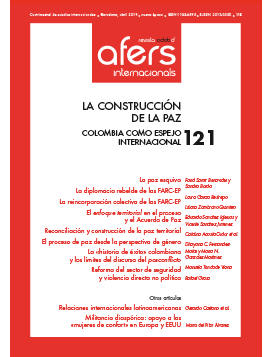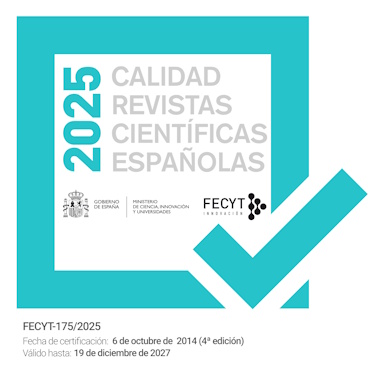Leadership and regionalisms in Latin American international relations
Keywords:
Latin American academics, regional leadership, Brazil, Mexico, Latin American foreign policies, futureAbstract
Revista CIDOB d’Afers Internacionals, nº 121
Quadrimestral (January-April 2019)
ISSN:1133-6595 | E-ISSN:2013-035X
DOI: doi.org/10.24241/rcai.2019.121.1.181
Taking the answers of over fifty Latin American scholars to a survey as its foundation, this paper analyses the features of the global and Latin American context and presents some of the potential areas for its development over the coming decade. To do this, the number of poles in the system is considered along with the patterns of cooperation and competition that predominate in the relations between countries. In addition, an analysis is made of how different countries define a “region” in their foreign policy, and the reasons behind Brazil losing its leadership position and Mexico’s potential role in the region are set out.
>> The full text articles of this issue are available only in Spanish language
References
Adler, Emanuel. «The Spread of Security Communities: Communities of Practice, Self-Restraint, and NATO’s Post-Cold War Transformation». European Journal of International Relations, vol. 14, n.° 2 (2008), p. 195-230.
Adler, Emanuel y Haas, Peter M. «Conclusion: Epistemic Communities, World Order, and the Creation of a Reflective Research Program». International Organization, vol. 46, n.° 1 (1992), p. 367-390.
Axelrod, Robert. La evolución de la cooperación: el dilema del prisionero y la teoría de juegos. Madrid: Alianza, 1996 [1986].
Axelrod, Robert. La complejidad de la cooperación. Modelos de cooperación y colaboración basados en agentes. Buenos Aires: Fondo de Cultura Económica, 2004 [1997].
Briceño Ruiz, José. «Hegemonía, poshegemonía, neoliberalismo, posneoliberalismo en los debates sobre el regionalismo en América Latina». En: Ardila, Martha (ed.). ¿Nuevo multilateralismo en América Latina? Concepciones y actores en pugna. Bogotá: Universidad Externado de Colombia, 2016, p. 23-66.
Burges, Sean W. «Revisiting consensual hegemony: Brazilian regional leadership in question». International Politics, vol. 52, n.° 2 (2015), p. 193-207.
Campos Mello, Patrícia. «Política externa de Serra demole princípios de Lula e Dilma». Folha de São Paulo, (18 de mayo de 2016) (en línea) http://m.folha.uol.com.br/mundo/2016/05/1772683-politica-externa-de-serra-demoleprincipios-de-lula-e-dilma.shtml?cmpid=facefolha
Del Arenal, Celestino y Sanahuja, José Antonio (coords.). Teorías de las Relaciones Internacionales. Madrid: Tecnos, 2015.
Dosch, Jörn y Goodman, David. «China and Latin America: Complementarity, Competition, and Globalisation». Journal of Current Chinese Affairs, vol. 41, n.° 1 (2012), p. 3-19.
Flemes, Daniel. «Brazilian foreign policy in the changing world order». South African Journal of International Affairs, vol. 16, n.° 2 (2009), p. 161-182.
Flemes, Daniel y Wehner, Leslie. «Drivers of strategic contestation: The case of South America». International Politics, vol. 52, n.° 2 (2015), p. 163-177.
Flemes, Daniel y Wojczewski, Thorsten. «Contested leadership in international relations: power politics in South America, South Asia and Sub-Saharan Africa». Giga Working Paper, n.º 121 (2010).
Grasa, Rafael. «Neoliberalismo e institucionalismo. La reconstrucción del liberalismo como teoría sistémica internacional». En: del Arenal, Celestino y Sanahuja, José Antonio (coords.). Teorías de las Relaciones Internacionales. Madrid: Tecnos, 2015, p. 97-195.
Heifetz, Ronald. Lidership Without Easy Answers. Boston: The Belknap Press of Harvard Business School Pres, 1994.
Heifetz, Ronald; Grashow, Alexander y Linsky, Marty. The Practice of Adaptive Leadership: Tools and Tactics for Changing Your Organization and the World. Boston: Harvard Business Review Press, 2009.
Heifetz, Ronald y Linsky, Marty. Leadership on the Line, with a New Preface: Staying Alive Through the Dangers of Change. Boston: Harvard Business Review Press, 2009.
Hurrell, Andrew. «One word? Many words? The place of regions in the study of international society». International Affairs, vol. 83, n.° 1 (2007), p. 127-146.
Ignatieff, Michael. «La cultura de lo instantáneo». Letra internacional, vol. 27, (1992), p. 45-47.
Innerarity, Daniel. El futuro y sus enemigos: Una defensa de la esperanza política. Madrid: Paidós Ibérica, 2009.
Jenkins, Rhys. «China and Brazil: Economic Impacts of a Growing Relationship». Journal of Current Chinese Affairs, vol. 41, n.° 1 (2012), p. 21-47.
Jenkins, Rhys. «Chinese Competition and Brazilian Exports of Manufactures». Oxford Development Studies, vol. 42, n.° 3 (2014), p. 395-418.
Jenne, Nicole; Schenoni, Luis Leandro y Urdinez, Francisco. «Of words and deeds: Latin American declaratory regionalism, 1994–2014». Cambridge Review of International Affairs, vol. 30, n.° 2-3 (2017), p. 195-215.
Lander, Edgardo. «¿Modelos alternativos de integración? Proyectos neoliberales y resistencias populares». Observatorio Social de América Latina, año 5, n.° 15 (2004), p. 45-56.
Maira, Luis. «¿Cómo afectará la crisis la integración regional?». Nueva Sociedad, n.° 224, (2009), p. 144-163.
Malamud, Andrés. «A leader without followers? The growing divergence between the regional and global performance of Brazilian foreign policy». Latin American Politics and Society, vol. 53, n.° 3 (2011), p. 1-24.
Moravcsik, Andrew. «Taking Preferences Seriously: A Liberal Theory of International Politics». International Organization, vol. 51, n.° 4 (1997), p. 513-553.
Pinheiro, Leticia y Gaio, Gabrieli. «Cooperation for Development, Brazilian Regional Leadership and Global Protagonism». Brazilian Political Science Review, vol. 8, n.° 2 (2014), p. 8-30.
Tussie, Diana y Riggirozzi, Pía y (eds.). The Rise of Post-Hegemonic Regionalism: The Case of Latin America. Londres: Springer, 2012.
Sanahuja, José Antonio. «Del “regionalismo abierto” al “regionalismo posliberal”. Crisis y cambio en la integración regional en América Latina». En: Martínez, Laneydi; Peña, Lázaro y Vázquez, Mariana (eds.). Anuario de la integración regional de América Latina y el Gran Caribe 2008-2009. Buenos Aires, CRIES, 2008, p. 11-54.
Sanahuja, José Antonio. «Crisis de globalización, crisis de hegemonía: un escenario de cambio estructural para América Latina y el Caribe». En: Serbin, Andrés (ed.). América Latina y el Caribe frente a un Nuevo Orden Mundial: Poder, globalización y respuestas regionales. Barcelona: Icaria Editorial, 2018, p. 37-68.
Sanahuja, José Antonio y Comini, Nicolás. «Las nuevas derechas latinoamericanas frente a una globalización en crisis». Nueva Sociedad, n.° 275 (2018), p. 32-46.
Saraiva, Miriam Gomes. «Brazilian foreign policy towards South America during the Lula Administration: caught between South America and Mercosur». Revista Brasileira de Política Internacional, vol. 53, n.° especial (2010), p. 151-168.
Serbin, Andrés; Martínez, Laneydi y Ramanzini Júnior, Haroldo (comps.). El regionalismo “post-liberal” en América Latina Latina y el Caribe: Nuevos Ac-tores, Nuevos Temas y Nuevos Desafíos. Anuario de la Integración Regional de América Latina y el Gran Caribe. Buenos Aires: CRIES, 2012.
Strüver, Georg. «‘Bereft of Friends’? China’s Rise and Search for Political Partners in South America». Chinese Journal of International Politics, vol. 7, n.° 1 (2014), p. 117-151.
Urdinez, Francisco. «The Political Economy of the Chinese Market Economy Status given by Argentina and Brazil». CS, vol. 14, (2014), p. 47-75.
Urdinez, Francisco; López Burian, Camilo y Oliveira, Amâncio de. «Mercosur and the Brazilian Leadership Challenge in the Era of Chinese Growth: A Uruguayan Foreign Policy Perspective». New Global Studies, vol. 10, n.° 1 (2016), p. 1-25.
Wendt, Alexander. Social Theory of International Politics. Cambridge: Cambridge University Press, 1999.













